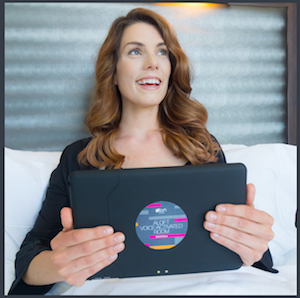 The Amazon Echo has spoiled us. We’re so used to talking to Alexa that when we’re traveling, we feel a void. Leor Grebler of UCIC, a company that helps brands build voice interactions, wrote about the strange feeling of not having the Alexa voice assistant in his hotel room during a recent business trip.
The Amazon Echo has spoiled us. We’re so used to talking to Alexa that when we’re traveling, we feel a void. Leor Grebler of UCIC, a company that helps brands build voice interactions, wrote about the strange feeling of not having the Alexa voice assistant in his hotel room during a recent business trip.
Leor might feel more at home now at Aloft Hotels in Boston and Santa Clara. Part of Starwood Hotels & Resorts Worldwide, Inc., Aloft Hotels announced the availability of voice-controlled rooms at those locations, with more to follow.
The Aloft rooms aren’t controlled by Alexa, though. Each room is equipped with an iPad that has a custom Aloft app installed. The app connects to accessories that are integrated with Apple’s Homekit. These accessories include the room’s thermostat, lights, and other unspecified devices.
Using this set up, hotel guests can use the familiar “Hey, Siri” voice command to control connected room features. For example, the guest can talk to Siri without getting out of bed to make the room cooler or warmer.
Based on the press release, Aloft Hotels worked with DigiValet to provide the voice-controlled room technology. The DigiValet website describes the company’s product as an iPad based guest room solution for luxury hotels. The technology enables guests to use natural language to adjust room controls, the television and movies on demand, order food, and read the newspaper. With clients all over the world, DigiValet describes its solution as multilingual.
As voice control becomes more mainstream, it makes sense that hospitality brands would seek to integrate the technology into their properties. Aloft Hotels seems to be getting a head start, which could attract what Brian McGuinness, global brand leader of Aloft Hotels, calls the “early adopter, hyper-connected global traveler.” I’d like to think that I fall into that group, but even if I don’t, I know lots of people who do.
Categories: Conversational Intelligence, Intelligent Assistants, Articles, Mobile + Location

 Opus Research Welcomes Ian Jacobs as VP and Lead Analyst
Opus Research Welcomes Ian Jacobs as VP and Lead Analyst  United Airlines, TXU Energy, and Memorial Hermann Among Opus Research’s 2024 Conversational AI Award Winners
United Airlines, TXU Energy, and Memorial Hermann Among Opus Research’s 2024 Conversational AI Award Winners  Views from the NICE Analyst Summit: Introducing the Experience Continuum
Views from the NICE Analyst Summit: Introducing the Experience Continuum  Opus Research Announces 2023 Conversational AI Award Winners
Opus Research Announces 2023 Conversational AI Award Winners